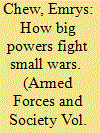| Srl | Item |
| 1 |
ID:
165188


|
|
|
|
|
| Summary/Abstract |
Increasing attention paid to US casualties in far-flung places such as Tongo Tongo, Niger, and headlines claiming ‘secret wars’ have fueled discussion about American military’s involvement in Africa. Though the continent has been a part of the American way of war since the beginnings of the US – consider the early combat actions of US Marines in Tripoli –, current African conflicts are challenging our understanding of war and approaches to winning it. This article examines the ways America seeks to achieve its ends in Africa with a particular focus upon the last 10 years of US counter-terrorism and stability operations in Niger and the Sahel Region. The author proposes unifying American, Allied, and partner efforts through a strategy of Active Containment.
|
|
|
|
|
|
|
|
|
|
|
|
|
|
|
|
| 2 |
ID:
127809


|
|
|
|
|
| Publication |
2014.
|
| Summary/Abstract |
"Globalized" low-intensity conflicts renew debates about how leading world powers contend with evolving complexities in unconventional warfare. The "foreign entanglements" of America's imperial present have been compared with the "savage wars of peace" from Britain's colonial past.1 Beyond the template of Anglo-American civilization, however, military, economic, and cultural manifestations of power must be set in their systemic and structural context for more meaningful comparison. Britain's variegated experience of unconventional warfare stemmed from its vast colonial milieu of "small wars" and "imperial policing." America's experience reflects transformational civil-military responses to both existential and ideological threats, reinforcing the evolution of a massive "way of war" over persistent frontier warfare. Integral to reading these small war traditions is the historical method, emphasizing particularity of causation while underscoring the value of flexible, hybrid approaches against overinstitutionalized "ways in warfare."2 Operational success, delivered by blending military skills with political savvy and cultural sensitivity, not only secured populations but support and legitimacy, without which even global powers risked defeat.
|
|
|
|
|
|
|
|
|
|
|
|
|
|
|
|
| 3 |
ID:
165181


|
|
|
| 4 |
ID:
165186


|
|
|
|
|
| Summary/Abstract |
The American way of war in Afghanistan presents a conundrum for proponents of 21st-century state-building projects. How can liberal peace proponents engage in efficient state building without sacrificing their ideals? The US learned that state-building allocates a degree of command and control to powerbrokers operating in the shadows to launder aid money, traffic illicit narcotics, and engage in extrajudicial punishments. These clients failed to represent the liberal values foreign patrons endorsed, because the latter not only offered resources without conditions but also rewarded bad behavior. This issue is examined by looking at the case of post-2001 northern Afghanistan, where powerful warlords should have held greater control over their paramilitary forces, limited predatory behavior, and built stronger relationships with the community. Instead, warlords-turned-statesmen expanded their material and social influence in the north, while holding onto the informal instruments of racketeering and patronage that overwhelmed Western ideals and shaped the predatory state present in Afghanistan today. Moreover, paramilitaries were influenced by material, social, and normative incentives that rewarded violent and predatory behavior and further eroded already weak community control mechanisms at the subdistrict level.
|
|
|
|
|
|
|
|
|
|
|
|
|
|
|
|